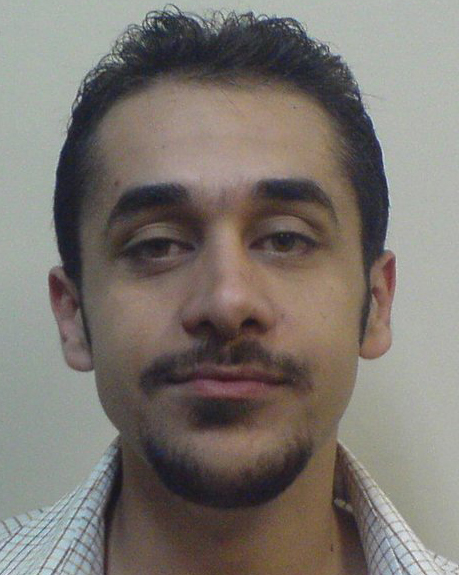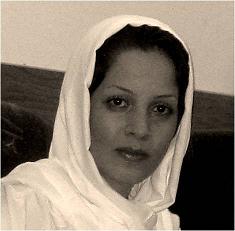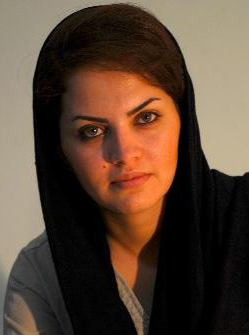In Their Own Words: Interviews with Students
Next Section: Barring Student Activists
Barring the Best and the Brightest: The Cases of Puyan Mahmoudian, Safoura Eliasi and Farzaneh Jalili
When banning students from higher education, Iranian officials often target some of the most academically qualified and gifted students in their fields. Puyan Mahmoudian, despite having achieved the sixth highest rank nationwide in the graduate entrance exam in Polymer Chemical Engineering, was denied the right to continue his education as he was “starred.”

Pouyan Mahmoudian (Source: Facebook)
Mahmoudian, currently continuing his education abroad, told the Campaign that his participation in student associations, as well as his involvement in a student publication, led to his deprivation from continuing his education.1 Mahmoudian was an officer for the student journal Rivar and a member of Daftar Tahkim-e Vahdat Student Union and the Islamic Student Association, campus groups critical of government and university policies.2 Mahmoudian was also detained by security forces in 2007 and later publicly alleged he had been tortured.3
I had previously been a member of the Student Union and the Islamic Student Association at Amirkabir University.4 I was also the executive officer for the student publication Rivar. Security forces detained me in 2007. I was later released on bail and during the same year took the graduate entrance exam. I should add that after my release, I continued my student activism. In 2008, the results of entrance exams were posted on the Internet and I achieved the sixth highest score. In the summer of 2008, officials from the Central Selection Committee [Hey’at Markazi Gozineh] contacted me.5
Following these events, Abdolrasoul Pour-Abbas, director of the Sanjesh Organization, the academic measurement bureau of the Ministry of Science, and a professor of mathematics at Amirkabir University, contacted Mahmoudian.6 “Pour-Abbas told me it was not a big issue and that representatives of the Herasat Office wanted to talk with me. I accepted and met with them,” Mahmoudian told the Campaign.7 Herasat Offices, which are found in most public facilities and all universities, are representatives of the Ministry of Intelligence and state security apparatuses. Mahmoudian told the Campaign:
There were three meetings, which were really like interrogation sessions, with people who claimed to represent the Herasat Office of the Ministry of Science. Dr. Noorbakhsh, the Director of the Faculty and Students Selection Committee, believed they were Intelligence Ministry agents. In the first two meetings, two men confronted me in an unfriendly and threatening manner. They wanted me to accept false confessions regarding my student publications and wanted me to send a letter to the Judiciary denying that I was tortured while in detention. During the second meeting, they even threatened to detain me. I confirmed that I was tortured and refused to deny it.
At the third meeting, they changed their manner. They didn’t ask for a denial [of torture] from me anymore. They just asked that I give guarantees that I will not engage in any more political activism. They had very comprehensive information about me and became friendlier. They said if I ceased political activism and stopped talking about my detention and torture, I should be able to continue my education. They also offered that I collaborate with the Intelligence Ministry and meet with their agents on a weekly basis…they said if I agree, they would give me guarantees that I would have no problems in pursuing my graduate degree. I accepted to end my political activities but refused to collaborate with them.8
At the time of entrance exam result announcements and student selection of fields of study, Mahmoudian contacted several Ministry of Science officials and members of Parliament to report his meetings to them.9 Eventually, Noorbakhsh invited him to a meeting. “He apologized to me for what had happened and promised there would be no problem,” Mahmoudian said.10
However, when the Ministry of Science announced the names of students who were permitted to register Mahmoudian did not qualify:
I immediately started to follow up this development. I went to Sanjesh and met with Dr. Noorbakhsh again. He expressed regret at my disqualification and said it was based on an article of admissions regulations that states, ‘An applicant who is an enemy of the state shall not be qualified.’ That’s all he said and asked me to keep it quiet for few months and not make any noise. He again promised to resolve the issue.11
Mahmoudian also sought assistance for his case from other officials who promised to help resolve the matter:
After a month, they also gave similar answers, that it was the Intelligence Ministry’s decision to disqualify me, regardless of my academic record. Interestingly enough, Dr. Noorbakhsh explicitly told me, ‘When the Intelligence Ministry is involved, there is nothing that I can do’…I publicized my case in the media and met with members of the Council for the Right to Education [a student advocacy group formed by students barred from continuing their higher education], including Mahdieh Golroo, Zia Nabavi, and Majid Tavakoli…I also met with human rights lawyer, Mr. Dadkhah, who told me there were no legal venues for pursuing my case.12
Regarding the lack of legal remedies and venues available to him, Mahmoudian told the Campaign:
A few months before my disqualification, other starred students barred from education filed a complaint with the High Court but received an answer that the Court cannot adjudicate their case because the Supreme Council of the Cultural Revolution was formed based on Ayatalloh Khomeini’s orders and its decisions are above the law and cannot be evaluated by the Supreme Court.13
Read about Zia Nabavi’s expulsion and sentencing for student activity

Safoura Eliasi
Safoura Eliasi was similarly targeted due to her involvement as director of Sepinood, a campus group focused on student issues, with student publications, and membership in the Guild Council while an undergraduate student:
For the next election of this Council [Guild Council], the Security Unit announced that my name could not be included on the list of candidates for election. During this time, I was barred from entering all buildings on campus. I had to file a complaint with the Ministry of Science against the university Security Unit, as they were barring my entrance without giving me an official letter…the Ministry of Science’s Basij took responsibility for this complaint. They offered that in return for cooperating with them, they would transfer me to Tehran University and solve all my problems.14
After graduating, Eliasi took the graduate entrance exam in 2008, but was told her file was incomplete:
In 2008, my transcript was issued in an incomplete way. My ranking was not clear on it. My transcript only said that I had until 21 June of that year to go to the Sanjesh Organization, 4th Floor. I went there. After I objected to my situation, they did not provide a clear answer about why my ranking had not been announced; they said they would follow through. But after many comings and goings, they never gave me a clear answer and they told me to sign up again next year.
Because of my excellent academic standing during my undergraduate studies, I could take advantage of the ‘gifted students privileges’ [intended for those who receive high grades in their undergraduate studies]. Therefore I went to inquire about continuing my education. They told me that I had to go to the university’s Cultural Revolution Council. The people in charge at this department treated me with disrespect and did not provide answers to my objections about the status of my further studies. Simultaneously, I received a letter from the university’s Security Office. I went there and was told me that if I reconsidered my extracurricular activities during the present academic year, perhaps I would be able to register at the university during the following year.
During the coming days, I received a letter from the Ministry of Intelligence in which I was asked to go to one of their offices for what they referred to as ‘a friendly chat.’ When I went there they told me that my ranking had not been announced because I had not married, and did not have responsibilities in my life, and because I had political activities during my education. They suggested that I get married, build a family, and to take a breather from all my friends for a while.15
Eliasi retook the graduate examination in 2009:
In 2009, after I took the nationwide graduate admission examination in Restoration of Historical Monuments; I ranked third nationwide. This meant that I could attend any university that offered this program. They allowed me to choose my discipline. But when my examination transcript arrived, it indicated that I had ‘failed the academic requirements.’ Considering my high ranking, I prepared a long letter of complaint and sent it to the Administrative Justice Court. An interesting point was that when I went to the Sanjesh Organization to review my transcript ranking, they told me that there was no applicant with these specifications! It was as if I had never taken part in the examination. After that, my inquiries from the Sanjesh Organization for determining the status of my education rendered no results.16

Farzaneh Jalali, (Source: Population of Combat Against Educational Descrimination)
Farzaneh Jalili is another distinguished student who was banned from her education due to political activity. Jalili was manager of Tehran University’s morning newspapers for one year as an undergraduate. She was summoned to the Revolutionary Court and the Ministry of Intelligence’s Follow-Up Unit after police forces attacked Tehran University dormitories following post-election unrest.17
Jalili completed the graduate entrance examination in 2010 and despite being ranked sixth nationally, was not allowed to enroll in university. Inquiring about her case, Jalili reported to the Sanjesh Organization and was told that the Ministry of Intelligence had reported negatively about her activities and she was therefore barred from continuing her education.
————————————————————




